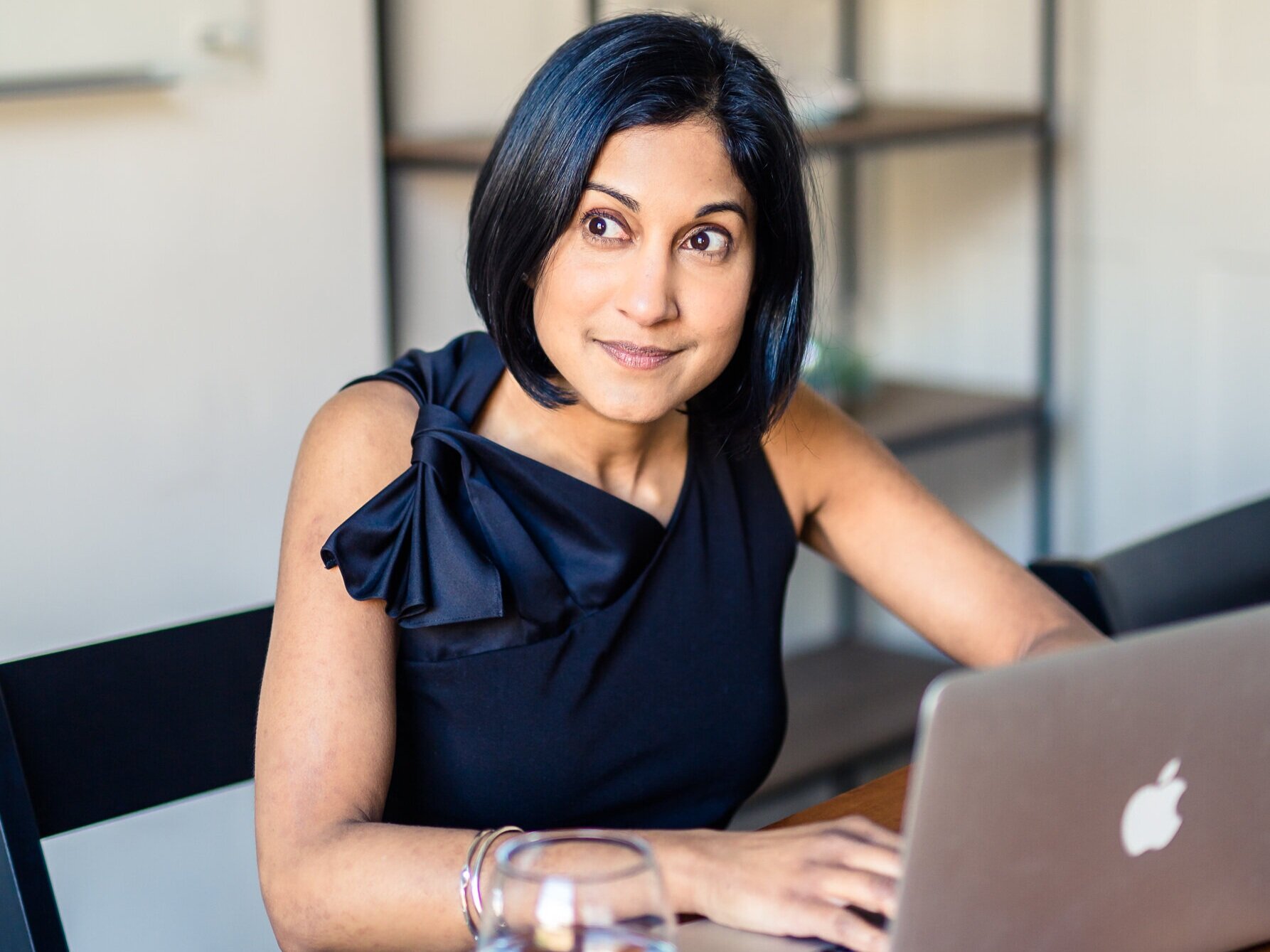

Insights
Stay at the cutting edge of diversity, equity & inclusion with the Avenir team’s latest research and insights
Articles
Stay current and cutting-edge with our latest thoughts, insights and advice from the Avenir team
#completeinclusion
In a special bonus episode of Why Care?, I had the privilege of a compelling and colourful conversation with the wonderful Blair Imani, historian, educator, author of Read This to Get Smarter, and known for her viral ‘Smarter in Seconds’ digital series. We touch on the importance of storytelling in social justice, Blair’s personal activism, and the prevalence of wildly inaccurate historical narratives. This got me thinking about what other narratives and ‘myths’ have crept upon us, taken stronghold, and don’t necessarily reflect the full truth - not just in history (though there are many of those), but even in the office.
On the 50th (!) episode of Why Care? I had the pleasure of a conversation with bestselling children’s author, Robin Stevens, best known for her internationally renowned Murder Most Unladylike series. In the episode, Robin shares the personal experiences that influence her writing, how her neurodivergence and lived experiences have shaped the stories she tells, and how stories can help young readers navigate the tricky topics of identity and belonging.
In the 49th episode of Why Care? I had the pleasure of an exciting conversation with the Permalloo Sisters - Shelina Permalloo, MasterChef winner and celebrated chef, and Pamela Permalloo Bass, a diversity, equity and inclusion expert with extensive experience in the NHS. In the episode we touch on culture, family, and the incredibly nuanced and endlessly fascinating topics of belonging, diaspora, and what it means to be British.
In the 48th episode of Why Care?, I had the pleasure of speaking with Michael Gunning, an elite swimmer and trailblazer for diversity and inclusion in sport. During our conversation, we touched on the way some media outlets have reported on Michael’s successes - labelling him as a ‘Black, gay swimmer’, as opposed to a world-class swimmer. This got me thinking about the effects of labels in the workplace.
In the 47th episode of Why Care?, I had the pleasure of speaking with Claire: a coach, Henley Business School Professor of Leadership, and my former MBA dissertation supervisor! In the episode, we delve into an issue that affects a staggering 49% of employees: toxic work environments. We explore how to identify toxic behaviours, the effects of gaslighting, and strategies for building resilience, alongside a shocking personal anecdote from Claire on her experience with workplace bullying.
In the 46th episode of Why Care? I had the pleasure of talking to serial tech entrepreneur Tarek Kamil. Tarek is the CEO of Cerkl, an AI-powered communication solutions company with a focus on social value and inclusion. During the episode, we explore Tarek’s journey from software engineer to serial founder, his unique personal approach decision-making, and how his company uses AI and personalised communications to enhance inclusion and employee engagement.
In the 45th episode of Why Care? I had the great pleasure of speaking to the multi-talented Sarah Mulindwa. Sarah has a colourful and fascinating career, merging both her background in nursing and her passion for fashion to become a big advocate for diversity, equity, and inclusion (DEI). In the episode, we talk about career changes, her work in sexual health education, and health challenges like menopause in the workplace, among other things.
In the44th episode ofWhy Care? I had the great pleasure of speaking to the wonderful Rosie Nixon, former Editor-in-Chief of HELLO!Magazine and author of four books. In the episode, Rosie opens up about the burnout that often comes with career highs, being defined by our professional lives, and the unique experiences of middle-aged women in the workforce.
Hamilton, a leading Diversity, Equity and Inclusion practitioner and author of Indivisible: How to Forge Our Differences Into a Stronger Future. She explained that pushback against DEI may be because the field has veered into “this Noah's Ark approach.”
On the latest episode of Why Care? I had the pleasure of interviewing Dr. Sandra Upton, a renowned industry thought leader, Chief Diversity, Equity & Inclusion (DEI) Strategist for Upton Consulting Group, a keynote speaker, and an esteemed author. Sandra’s impressive 25+ years of experience in the field were incredibly insightful in our discussion on overcoming resistance in DEI work, building effective DEI governance, and ensuring long-term success through her 8-step DEI Propel framework. Our discussion about the current ‘backlash’ on DEI prompted me to explore the subject further: the reasons behind it, and how organisations can work around it.
In the 41st episode of Why Care?, I had the pleasure of a fascinating conversation with a prolific thought leader in the theatre space. Tegan Summer is a renowned writer, producer and lyricist, whose powerful bio-musicals have captivated audiences from Broadway to the West End. Tegan’s time as a Black producer brought an intriguing perspective to our conversation on representation in theatre and the unique experiences of underrepresented groups. Our conversation ultimately got me thinking about the stories that performing arts tell us, and the impact of their different narratives.
In the second special celebrity episode of Why Care? I am joined by double gold Olympic Champion Dame Kelly Holmes. Kelly is the first woman ever in Great Britain to win two gold medals at the same games, and has gone on to obtain a litany of impressive accomplishments, including BBC Sports Personality of the Year and European Athlete of the Year following her 2004 wins. During our conversation, Kelly shares her difficult experience navigating the systemic discrimination present in the army in the 1980s-90s, and the psychological trauma it caused. This got me thinking about how organisations can help destigmatize mental health concerns and create psychological safety within teams.
In a celebrity special episode of Why Care?, I had the pleasure of speaking to the inspirational Dr Ranj, an NHS doctor, BAFTA award-winning TV presenter, best-selling author, keynote speaker, radio host and much more. In this insightful and captivating conversation, Dr Ranj shares his journey with inclusion, both through personal anecdotes and experiences from his varied and extensive career. During the conversation, we touched on Dr Ranj’s time on BBC’s Strictly Come Dancing, where he discusses the Diversity, Equity and Inclusion (DEI) journey that the show has taken, stating that in order for it to be inclusive it had to develop a “two-way understanding between itself and its audience”.
In Episode 40 of Why Care? I am joined by the brilliant and highly entertaining David McQueen to delve deeper into his brand-new book, The Brave Leader.
We touch on subjects such as the importance of followership, his BRAVE framework for good leadership, and how to take a systems approach to inclusive leadership.
In the 39th episode of Why Care? I had the pleasure of speaking to Amber Cabral, global inclusion leader, executive coach, TEDx and keynote speaker, and best-selling author.
We touched on speaking up when witnessing or experiencing exclusionary behaviour, as well as nurturing a positive feedback culture within organisations. In this article, I will delve deeper into Amber’s constructive and helpful advice on confronting these scenarios and the reasons behind why it is effective.
In Episode 38 of Why Care?, I had the pleasure of talking to Jenny Garrett, career coach, leadership developer, TEDx Speaker and author of Equality vs Equity, among many other impressive accomplishments. We cover a range of topics including the myth of meritocracy, colourism and the interests of majority groups in DEI.
In conversation with Jenny, I was taken aback as she shared a shocking incident of racism that she experienced at a gala dinner, where the lack of allyship from witnesses impacted her greatly. She reflects that the witnesses had not taken into account that “my pain was everyone’s pain”. This sparked my thoughts on the ways in which exclusion, whether it takes place on a small or large scale, negatively impacts everyone in the local and global community.
In Episode 37 of Why Care?, I had the pleasure of speaking to the Founder and CEO of Untapped Leadership and author of a book by the same name, Jenny Vaquez-Newsum. We discuss everything from the race penalty, to imposter syndrome and the importance of contextual agility in leadership.
The conversation led us to noting how individuals may experience the same workplace very differently. Although many of us are familiar with some of the common issues limiting organisational inclusion, we may be less clear on their impact on people’s day-to-day experiences of the workplace, and ultimately on progression prospects. Let’s take a deeper look at two of these.
Sheree Atcheson, a multi-award-winning Senior Diversity & Inclusion Executive, contributor to Forbes and author of Demanding More, uses this example in Episode 36 of Why Care? to emphasise the importance of maintaining the ‘nuances’ of stories. This sparked my thoughts on the coexistence of multiple truths and layered narratives. What other narratives may co-exist, and what discomfort do they rouse if we open ourselves to them?
Today, I’d like to focus on two truths. The truth that a given demographic can be underrepresented in the workplace and society at large, while simultaneously having a greater advantage over other underrepresented groups.
On Episode 35 of Why Care?, I had the pleasure of speaking to the founder of Compelling Culture and author of the recently-published book Conscious Inclusion, Catherine Garrod. The episode offered a wealth of new information and thought-provoking ideas, including an alternative to the terms ‘majority’ and ‘minority’ groups and a personal story of shocking sexual abuse from a delivery driver, which illustrates so clearly that organisations need to be more active in taking accountability and action.
Towards the end of the episode, Catherine explains that leaders can sometimes feel overwhelmed and pressured when faced with the task of addressing equity within their organisation and the role that employees can play in mitigating these concerns. This sparked my thoughts on how workplace relationships are impacted by new DEI initiatives, the challenges that may arise, and how to work through them constructively.
In Episode 34 of Why Care?, I had the pleasure of speaking to both Chris Altizer and Gloria Johnson-Cusack, co-authors of the book Growing the Elephant, which primarily proposes a linguistic shift of the term ‘privilege’, to the more specific and helpful distinction of ‘earned’ and ‘unearned advantages’.
Referring to the lived experiences of exclusion and discrimination within organisations and systems at large, Chris remarks during the episode that ‘we must become comfortable with what’s real’ in order to improve it. This point touches on a topic that is central to DEI practice, and which I will expand on in this article.
I break down both the importance of becoming comfortable with the constructive discomfort that must occur when implementing DEI in workplaces, as well as how to utilise it effectively.
I recently interviewed Amri Johnson, CEO and founder of Inclusion Wins, in Episode 33 of Why Care?. We spoke about the differences between leading with emotion as opposed to reason, amongst many other things.
Amri eloquently highlighted that those in the minority, both within DEI and beyond it, increasingly fall into the trap of alienating the majority, who are perceived as not doing enough, not understanding the struggle, or having contributed to oppression and discrimination over the centuries.
I recently interviewed Sue Unerman, Chief Transformation Officer and Global Head of Relevance at EssenceMadiacomX for Episode 32 of Why Care?, where we spoke about the importance of cultivating belonging within organisations. I wanted to pick up on one thread of our conversation that truly resonated with me: the significance of who is actively involved - that is both listening and speaking - in conversations surrounding DEI, as it is a growing challenge that those who hold the most potential for change are not involved in said discussions.
I hear the phrase 'representation matters' quite often, mostly in regards to inspiring children with visible role models who look like them. However, representation doesn't just matter for children! I have spoken to numerous people during my work who have shared how important representation has been for them as adults, from leaders in their organisation or field.
Recently, I spoke to Pat Phelan, Chief Customer Officer at GoCardless, for Episode 21 of the 'Why Care?' podcast - Self-Reflection as a Superpower.
As the episode title suggests, Pat credits much of his approach to inclusive leadership as being down to his comfort with reflecting on himself and his actions. Reflecting myself, I realised that my biggest takeaway from our conversation was that self-reflection is one of the most important tools in an inclusive leader's toolbox, and it's a common thread I've seen through almost very inclusive leader I've met.
Recently, I spoke to my cousin and Head of Product at Shell Energy, Elvin Nagamootoo for a very special episode of the ‘Why Care?’ podcast. (You can find that episode on all podcast platforms or here: https://lnkd.in/eeRTnvca)
During the episode Elvin spoke about how he was diagnosed with dyslexia as an adult, and how it was a revelatory moment for him as it explained his experiences as a kid of feeling different – particularly during school where he was labelled as a ‘disruptive child’.
Elvin's experiences are unfortunately not unique and many adults get late diagnoses of dyslexia in adulthood, and there are likely even more adults with dyslexia who have never been diagnosed. This article explains dyslexia and some of the simple things that leaders and organisations can do to make lives easier for their dyslexic employees.
When speaking to Shawna Ferguson the Senior Managing Director & Director of Global DEI at Wellington Management on my last episode of 'Why Care?', she highlighted their recently published Global Diversity, Equity and Inclusion report. The report shares all their internal diversity data with the public for complete transparency. Its a bold move but this level of transparency is vital to progressing DEI both within an organisation but also societally.
Read my latest article to learn more about what transparency means and the benefits to organisations who choose to follow Wellington and others who are leading the way.
In my latest article, I reflect on my conversation with Pauline Miller, Chief Equity Officer, EMEA at Dentsu, for Episode 19 of the 'Why Care?' podcast. During the episode, Pauline shared some really insightful nuggets of wisdom that she has learnt throughout her career as a DEI professional, that simply just had to be written down!
They really are some fantastic tips on DEI best practice, how to maintain DEI as a strategic imperative in your organisation, and how to build on the momentum of your successes as a practitioner!
In my latest article, I reflect on my conversation with Rukasana Bhaijee for Episode 17 of the podcast and the topic of minimising one's identity to 'fit in'.
These behaviours, referred to as covering, are common tactics amongst minorities- perhaps more common than you think!
In ‘Why Care?’ Episode 16 - Active Allyship with Marc McKenna-Coles, Marc mentioned the concept of being 'future ready' as an organisation.
This is the idea of staying ahead of the curve amongst your competitors, and even wider society, as an organisation with your inclusion policies by anticipating the needs of your employees well into the future. In this article I outline what it means to be future ready, the benefits of being so, and how Avenir can help with the process.
In this week's article, I talk about the concept of 'positive' stereotypes, when a stereotype suggests a group of people are inherently good at something, and how these can be just as harmful long-term as negative stereotypes are.
The article was inspired by the conversation I had with Sheri Crosby Wheeler for 'Why Care?' Episode 15, where we discuss the life-long effects stereotyping can have on young people in school.

Reports
The latest research and reports from the Avenir Team
In this free report, we address some of the most common challenges leaders face: how to navigate the uncomfortable, knotty complexity that comes with leading with inclusion. We also tackle pressing questions such as how to support leaders in becoming more receptive to learning, acknowledging biases and inequities, understanding diverse perspectives, and enhancing their willingness to act to foster inclusion and equity.
In this free report, we address the key barriers to inclusive leadership, including the preference for equality over equity, the lack of courage and tools, and the lack of support in DEI practices. Also, we offer solutions to help leaders overcome these barriers and valuable recommendations to organisations on fostering inclusive leadership in the workplace.
In this free report, we highlight the common barriers to achieving workplace inclusion, including egocentrism and issues of backlash AND we offer solutions to overcome them. PLUS valuable recommendations to organisations wanting to make progress in their DEI journey.
Equal Lives reveals that men and women have very similar attitudes and desires in relation to balancing work and caring responsibilities. During 2018, over 10,000 employees told us about their experiences, attitudes and aspirations in relation to balancing professional employment with personal caring responsibilities for both children and adults.
Webinars & Videos
Watch videos and webinar recordings, giving insight into key knowledge from the Avenir team and expert guests
This Webinar sees Nadia along with Avenir Consulting Services Cultural Inclusion Specialists, Silke Irmscher and Vida Skreb, for an engaging and powerful discussion on:
Examples of polarising topics and where cultural clashes are likely to play out
The psychology and neuroscience behind our cultural identity and what happens when cultural differences meet.
How leaders can respond to help nurture a collaborative and inclusive environment






































